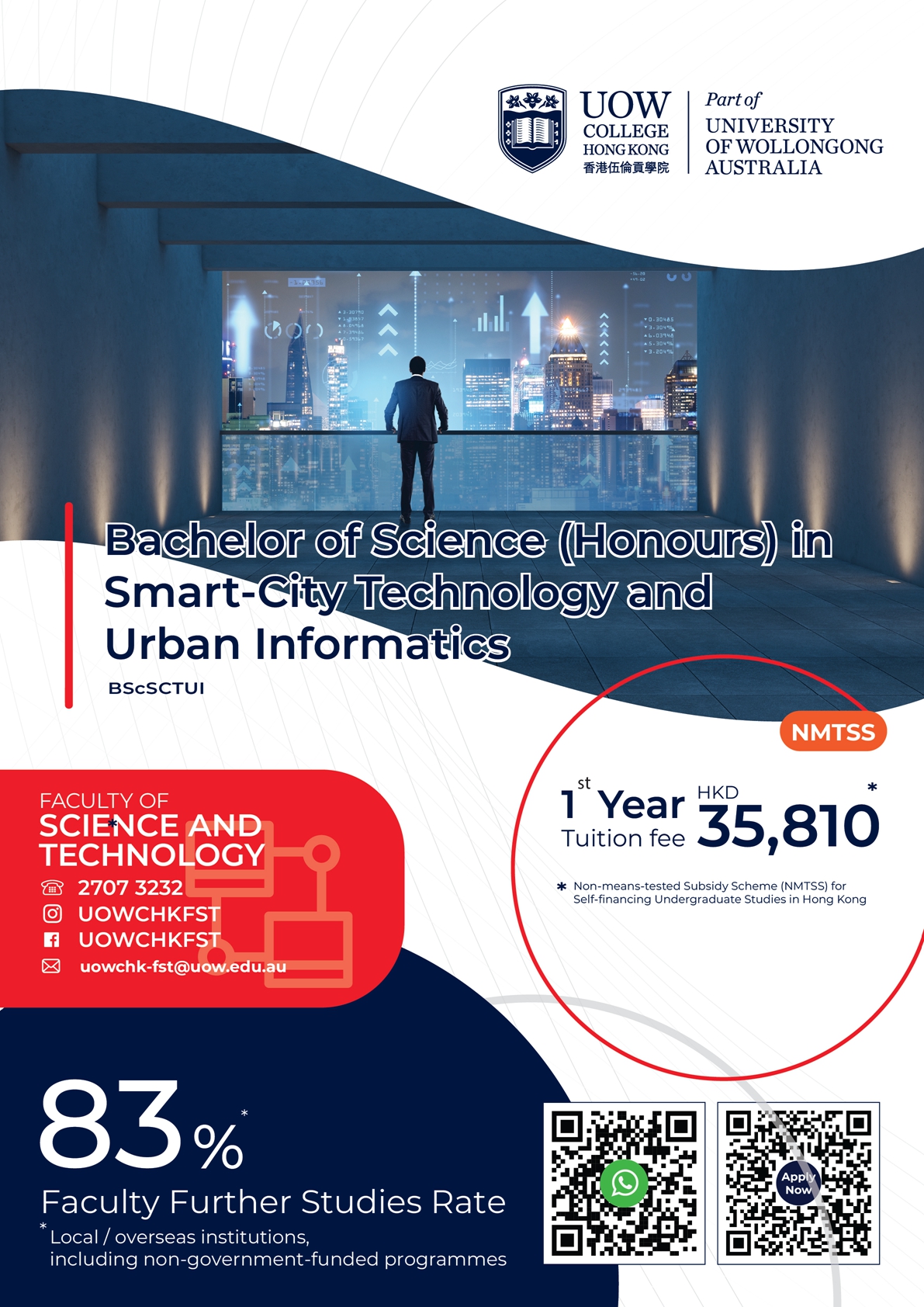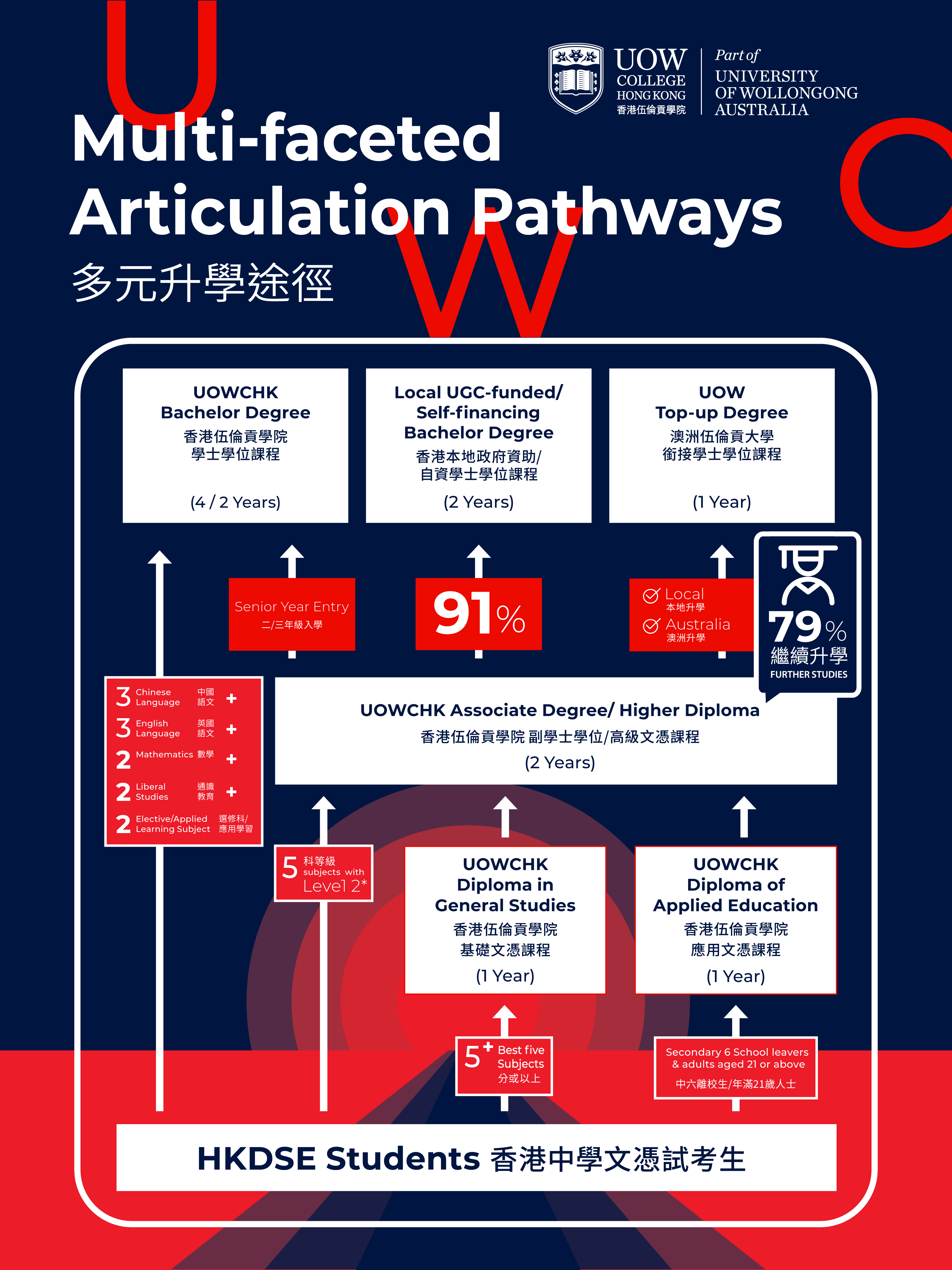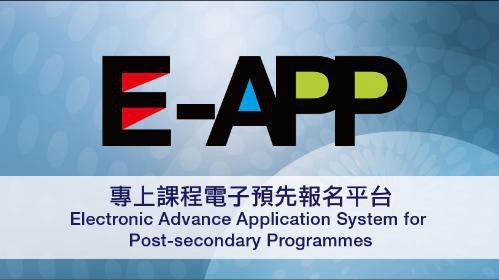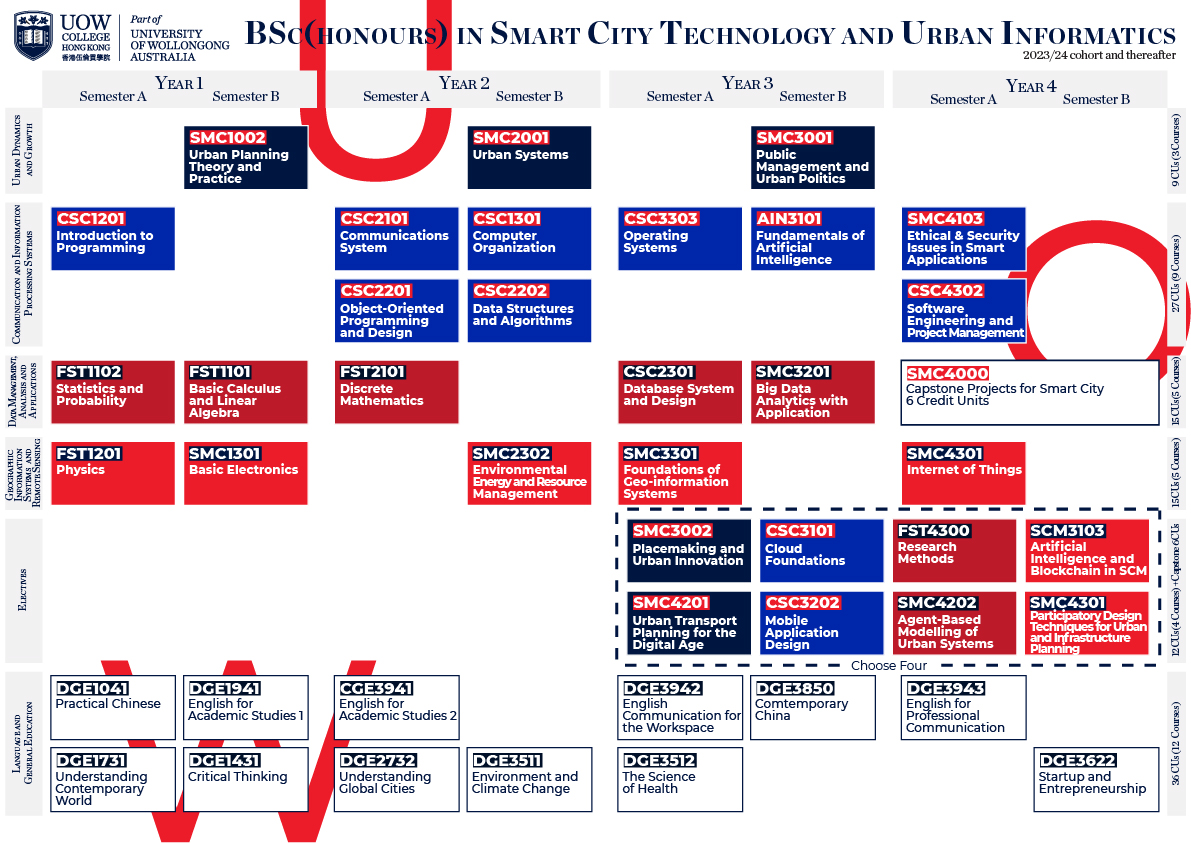Information Technology
- Bachelor of Computer Science
- Bachelor of Science (Honours) in Artificial Intelligence
- Bachelor of Science (Honours) in Smart-City Technology and Urban Informatics
- Associate of Science in Network and Systems Administration
- Associate of Science in Information Systems Development
- Higher Diploma in Application Systems Development
- Higher Diploma in Computer Network and Systems Administration
Bachelor of Science (Honours) in Smart-City Technology and Urban Informatics
Smart-City Technology and Urban Informatics
Launched in 2023-24, the programme is designed to equip students with a comprehensive understanding of smart city concepts and technologies. The curriculum focuses on developing conceptual, intellectual, and technical skills necessary to revolutionize city planning, construction, and service provision. The programme aligns with the Smart City Blueprints promoted by the government, ensuring graduates are well-prepared to contribute to the advancement of smart city initiatives.
APPLY NOW- PROGRAMME INFORMATION
- Articulation Pathways
- Admission
- ENTRY REQUIREMENTS
- Fees & Financial Assistance

Programme information
| FACULTY | Faculty of Science and Technology |
| PROGRAMME | Bachelor of Science (Honours) in Smart-City Technology and Urban Informatics |
| PROG. CODE | BSCSCTUI |
| CAMPUS | Tai Wai |
| QF LEVEL | 5 |
| DURATION | 4 years |
| CREDIT UNITS | 120 CUS (4yrs) |
| AWARD TYPE | Bachelor Degree |
| QR REF/ VALIDITY PERIOD | 23/000208/L5 01/09/2023-31/08/2028 |
Programme leaflet
Programme Leaflet of the BScSCTUI programme in 2024-25
Programme enquiry
For enquiries, please contact Faculty of Science and Technology (Telephone No: 2707 3232 or Email: uowchk-fst@uow.edu.au).

Applications can be submitted by the following methods:

|

|

|
|---|---|---|
|
Online Application |
Electronic Advance Application System for Post-secondary Programmes (E-APP) |
By Post / In Person (Application Form) |
Click here for more information on admissions procedures.
For admission to bachelor degree programmes, applicants must meet the following requirements:
Year 1 Entry
Hong Kong Diploma of Secondary Education Examination
| HKDSE Subjects | Chinese Language | English Language | Mathematics | *Citizenship and Social Development | Any 1 Elective |
| Level Requirement | 3 | 3 | 2 | Attained | 2 |
|---|
- *Applicants with previous HKDSE subject result of “Liberal Studies” will be used as the alternative of the core subject requirement of “Citizenship and Social Development”.
- Mathematics Extended Part Module 1 or Module 2 (Level 2), Category C Other Languages (Grade E), and Category B Applied Learning subjects (Attained) are only accepted for programmes in a relevant disciplinary area.
Other Qualifications
- Other Qualifications (e.g. GCE AL, International Baccalaureate, or AP) will be considered on a case-by-case basis.
- Mature applicants must be over the age of 23 by 1 September of the year of admission and be able to demonstrate aptitude and suitability for the programme applied for.
Note
For non-Chinese speaking applicants who:
- have learnt Chinese Language for less than six years while receiving primary and secondary education;
OR - have learnt Chinese Language for six years or more in schools, but have been taught an adapted and simpler Chinese Language curriculum not normally applicable to the majority of students in the local schools, the following language qualifications can be accepted as alternative qualifications in Chinese language:
- “Attained” in Applied Learning Chinese
- Grade E in GCE (A/AS Level) Chinese
- Grade C / Grade 4 in GCSE / IGCSE Chinese
Fees
Application Fee
HK$150
Application fee is payable when applicants are invited for interviews. Application fee can be paid by the following methods:
- By direct deposit at any branch of the Hang Seng Bank or ATM transfer (Bank Code: 024) (A/C number: 359-300001-004) OR
- By Octopus Card at the College Office
Total Tuition Fee
| Total Tuition Fee | 1st Year | 2nd Year | 3rd Year | 4th Year | Total |
|---|---|---|---|---|---|
| Year 1 entry intake | |||||
| Tuition Fee | HK$70,200 | HK$70,200 | HK$76,200 | HK$76.200 | HK$292,800 |
| *Local with NMTSS | HK$35,810 | HK$35,810 | HK$41,810 | HK$41,810 | HK$155,240 |
Annual Tuition Fee for Year 1 and 2: HK$2,340/credit;
Annual Tuition Fee for Year 3 and 4: HK$2,540/credit
All Full-time Bachelor Degree (4-year Programme) students are required to take 120 credits. Total tuition fees for four years are about HK$292,800 or *HK$155,240. Tuition fees are charged according to the number of course credits taken by a student with variation.
*Qualified local students of our College enrolled in the UOWCHK degree will be eligible for the Non-means-tested Subsidy Scheme for Self-financing Undergraduate Studies in Hong Kong (NMTSS). In the 2024/25 academic year, students can obtain an annual subsidy up to HK$34,390. For details, please check on the website NMTSS FAQs.
Other Fee
A Graduation Fee of HK$400 will be charged upon enrolment in a programme.
Financial Assistance
Students enrolled in self-financing Bachelor/Associate Degree /Higher Diploma programmes are eligible to apply for financial assistance from the following sources:
Financial Assistance Scheme for Post-Secondary Students (FASP)
Provides means-tested financial assistance to needy full-time students pursuing locally-accredited, self-financing post-secondary education programmes at the level of associate degree, higher diploma or degree. The scheme aims to provide financial assistance to needy students so that no eligible students will be denied access to post-secondary education because of lack of means.
Enquiries: 2152 9000
Website: Financial Assistance Scheme for Post-Secondary Students
Non-means Tested Loan Scheme for Post-Secondary Students (NLSPS)
The NLSPS is used to complement the Financial Assistance Scheme for Post-secondary Students (FASP) to provide loan(s) to eligible students to settle tuition fees of locally-accredited, self-financing full-time post-secondary education programmes at the level of associate degree, higher diploma or degree
Enquiries: 2150 6222
Website: Non-means Tested Loan Scheme for Post-Secondary Students
Programme structure and outcomes
- Learning outcomes & Main subject areas
- Programme study flow & structure
- Further Studies Pathways & Career prospects
- Graduate Profile and Employment Pathway
Programme Intended Learning Outcomes
Programme Intended Learning Outcomes (PILOs) are statements of learning achievement that are expressed in terms of what the learner is expected to know, understand and be able to do upon completion of a course. Students graduating from this programme will be able to:
| PILO | Description |
|---|---|
| 1. | Apply essential computing theories, urban domain knowledge, emerging technologies and urban informatics to smart city development projects. |
| 2. | Design and implement technology solutions with urban informatics to enhance public services and address city challenges. |
| 3. | Develop smart city solutions integrating technological components, the social context and ethical considerations. |
| 4. | Act professionally, with a sense of integrity, accountability and responsibility. |
| 5. | Use effective communication and interpersonal skills in business and technical communities. |
Main subject areas
- Urban Planning Theory and Practice
- Public Management and Urban Politics
- Urban Transport Planning for the Digital Age
- Placemaking and Urban Innovation
- Communication and Information Processing Systems
- Artificial Intelligence
- Cloud Computing
- Software Engineering and Project Management
- Ethical and Security Issues in Smart Applications
- Mobile Application Design
- Big Data Analytics with Application
- Agent-Based Modelling of Urban Systems
- Geographic Information Systems and Remote Sensing
- Internet of Things
- Environmental Energy and Resource Management
Programme study flow
Programme structure
To qualify for this award, a candidate shall accrue an aggregate of at least 120 credit units (60 credit units for 2 year senior entry) by satisfactory completion of the following programme requirements:
| Degree requirements | 4 yr CUs | |
|---|---|---|
| General Education | 36 | |
| Programme Core & Electives | 84 | |
| Minimum credit points | 120 | |
Programme Core
| Course Code | Course Name |
|---|---|
| Programme Coure (72CUs) | |
| Sem A, Year 1 | |
| CSC1201 | Introduction to Programming |
| FST1102 | Statistics amd Probability |
| FST1201 | Physics |
| Sem B, Year 1 | |
| FST1101 | Basic Calculus and Linear Algebra |
| SMC1002 | Urban Planning Theory and Practice |
| SMC1301 | Basic Electronics |
| Sem A, Year 2 | |
| CSC2101 | Communications System |
| CSC2201 | Object-Oriented Programming and Design |
| FST2101 | Discrete Mathematics |
| Sem B, Year 2 | |
| CSC1301 | Computer Organization |
| CSC2202 | Data Structures and Algorithms |
| SMC2001 | Urban Systems |
| SMC2302 | Environmental Energy and Resource Management |
| Sem A, Year 3 | |
| CSC2301* | Database System and Design |
| SMC3301* | Foundations of Geo-information Systems |
| CSC3303* | Operating Systems |
| Sem B, Year 3 | |
| AIN3101* | Fundamentals of Artificial Intelligence |
| SMC3001* | Public Management and Urban Politics |
| SMC3201* | Big Data Analytics with Application |
| Sem A, Year 4 | |
| CSC4302* | Software Engineering and Project Management |
| SNC4301* | Machine Learning |
| SMC4103* | Data Mining |
| SMC4000** | Capstone Project for Smart City ( 6Credit Units )** |
| Sem B, Year 4 | |
| SMC4000** | Capstone Project for Smart City ( 6Credit Units )** |
| Programme Electives (12CUs) | |
| Sem A & B, Year 3 & Year 4 Select any four: |
|
| SMC3002* | Placemaking and Urban Innovation |
| CSC3101* | Cloud Foundations |
| SCM3103* | Artifical Intelligence and Blockchain in SCM |
| CSC3202* | Mobile Application Design |
| SMC4201* | Urban Transport Planning for the Digital Age |
| SMC4202* | Agent-Based Modelling of Urban Systems |
| SMC4301* | Participatory Design Techniques for Urban and Infrastucture Planning |
| FST4300* | Research Methods |
| Language and General Education (36CUs) | |
| DGE1041 | Practical Chinese |
| DGE1941 | English for Academic Studies 1 |
| DGE3941 | English for Academic Studies 2 |
| DGE3942 | English Communication for the Workspace |
| DGE3943 | English for Professional Communication |
| DGE1431 | Critical Thinking |
| DGE1731 | Understanding Contemporary World |
| DGE2732 | Understanding Global Cities |
| DGE3511 | Environment and Climate Change |
| DGE3512 | The Science of Health |
| DGE3622 | Startup and Entrepreneurship |
| DGE3850 | Comtemporary China |
|
* Senior year entry |
|
Further Studies Pathways
This programme will start to be offered in 2023-24. Articulation possibilities may include:
City University of Hong Kong
- Master of Urban Design and Regional Planning
- Master of Arts in Housing and Urban Management
The Chinese University of Hong Kong
- Master of Science in Geoinformation Science and Smart Cities
The Hong Kong Polytechnic University
- Master of Science in Urban Informatics and Smart Cities (MSc)
- Postgraduate Diploma in Urban Informatics and Smart Cities (PgD)
The Hong Kong University of Science and Technology
- Master of Science Programme in Intelligent Building Technology and Management
- Master of Science Programme in Information Technology
The University of Hong Kong
- Master of Science in Urban Analytics
Tsinghua University, China
- Smart Cities Convergence Master’s Programme
Singapore Management University, Singapore
- Msc In Smart Cities and Urban Analytics
University College London, UK
- Smart Cities and Urban Analytics MSc / PG Dip
Northumbria University London, UK
- MSc Technology for Sustainable Cities
Manchester Metropolitan University, UK
- MSc - Engineering Smart Systems
University of Europe for Applied Sciences, Germany
- Smart City Management, MA
Career prospects
Graduates will be competent for a wide range of smart city-related jobs across various sectors, which include:
- Government and Public Services
- Software Engineer/Web developer for Automation and Intelligence
- Public Utilities (Water, Town Gas, Electricity and Telecommunication)
- Mobility and Transportation
- Network Engineer/Consultant for IoT and Smart City
- Devices and Technologies for Urban Networks
- Mapping and Geographic Information Services
- Business Development and Social Economics
- Companies focused on geographic data services and technological services for urban areas
- Cultural and Tourism Management
- Environmental Management
- Technical Consultant for Smart Automation
- Traffic Consultants
Graduates can also apply their knowledge and generic skills in smart city and urban informatics acquired from the programme to enter entry-level positions such as Officers, Analysts or Supervisors in smart-technology-driven business / organization units.
Please click "-" of the programme for details.
Faculty of Science and Technology
Phone / Whatsapp: (852) 2707 3232
Fax: (852) 2707 3231
Email: uowchk-fst@uow.edu.au
Address: 1/F, Le Billionnaire, 46 Sa Po Road, Kowloon City, Hong Kong
[Sung Wong Toi MTR Station Exit B3]
College Office
Telephone: (852) 2707 3111
Fax: (852) 2707 3222
E-mail: uowchk-main@uow.edu.au
Address: 1/F, Billionnaire Royale, 83 Sa Po Road, Kowloon City, Hong Kong
[Sung Wong Toi MTR Station Exit B3]
